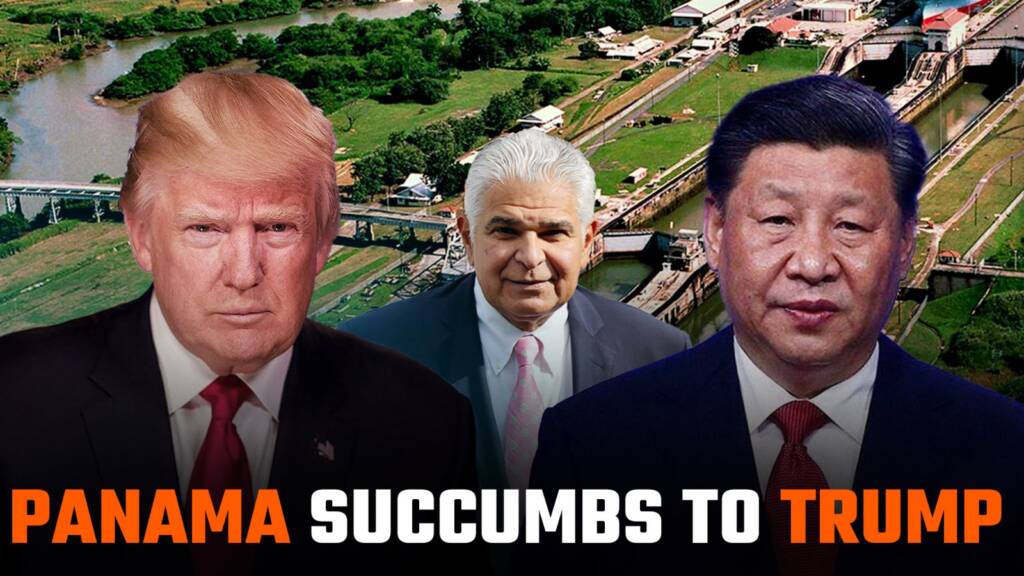The last two weeks have been nothing short of a political earthquake. With Donald Trump making a dramatic return to the White House, global power shifts are happening fast. And now, Trump has set his sights on Panama, demanding they roll back China’s influence over the Panama Canal—or face the consequences. The threats seem to have worked in record time, as the Central American nation has now moved quickly to allay the demands of Washington seemingly accepting all conditions and backing out of China’s BRI project.
Trump has maintained that China’s growing presence in the canal violates past agreements, and he’s not mincing words about what happens next if this continues. Military action too is now not considered off the table. His new Secretary of State, Marco Rubio, doubled down, calling the situation “unacceptable” in a heated exchange with Panama’s President José Raúl Mulino.
Caught in the middle, Mulino is trying to walk a fine line. He’s promised to review the country’s deals with China but made it clear that Panama won’t be pushed around. Meanwhile, Beijing has been left completely blindsided. Even Xi Jinping will be baffled by Trump’s latest masterstroke, as China scrambles to figure out its next move.
Panama’s President Raúl Mulino made it clear that he may not sign the BRI agreement in near future. He stated that Panama’s sovereignty over the canal is not up for debate. After meeting with US Secretary of State Marco Rubio, Mulino reassured that while he acknowledged US concerns over China’s presence, the canal remains under Panama’s control, no matter what happens.
However, there’s a twist. Panama won’t be renewing its 2017 Belt and Road deal with China, signaling an early exit from Xi Jinping’s grand development plan. Instead, Mulino is looking to boost US investments, especially in infrastructure, calling Rubio’s visit a step toward stronger Panama-US ties.
The US State Department warned that if China’s influence grows around the canal, Washington might have to take necessary measures under a decades-old treaty. That treaty, signed in 1977, handed the canal back to Panama but gave the US the right to intervene militarily if its neutrality is compromised.
Panama Backs Out
If Mulino isn’t convinced by Panama’s statement, it may actually send in troops, but Trump’s repeated talk of “taking back” the canal has already rattled diplomatic circles. With tensions rising and China caught in the middle, the canal is once again becoming a global flashpoint—one that could reshape US-Panama relations in ways nobody expected.
Panama has also launched an audit into Panama Ports Company, a firm linked to China that operates two terminals near the canal. President Raúl Mulino confirmed the review, saying authorities will wait for the results before deciding on legal actions.
The company, a subsidiary of Hong Kong-based CK Hutchison Holdings, is one of the world’s largest port operators, managing 53 ports across 24 countries—including key US allies like the UK, Australia, and Canada. However, Hutchison does not control access to the Panama Canal; its workers handle container loading, fuel supply, and logistics, just like competing firms in the region.
With Trump ramping up pressure to curb Chinese influence, this audit could reaffirm Washington while maintaining its own sovereignty and devastate China’s influence.
This is no hidden fact that China has a big expansionist agenda. China has significantly expanded its influence in Panama and across the Americas through strategic investments and diplomatic initiatives.
In Panama, Chinese firms have invested heavily in port operations near the Panama Canal like the ports of Bolboa and port of Cristobal, a critical global trade hub in the Americas. This has raised concerns in Washington about potential impacts on the canal’s neutrality.
Regionally, China’s Belt and Road Initiative has led to substantial infrastructure projects, strengthening economic ties with various Latin American countries.
While these investments boost local economies, they also prompt debates over sovereignty and geopolitical alignment, as nation’s balance economic benefits against growing Chinese influence.
Trump’s military warning has sparked panic in Panama, where leaders are now scrambling to balance sovereignty with economic interests. Panama thrives on its strategic position and revenue from the canal, and direct U.S. control could mean a major financial and geopolitical shift.
Losing autonomy over the canal would not only cut into Panama’s profits but also shake its standing as a global trade hub. It seems the Central American nation has now capitulated to all of Washington’s concerns and demands. The stakes for Panama are high and the nation believes ditching China is better than taking the Bull named Trump by its horns.
